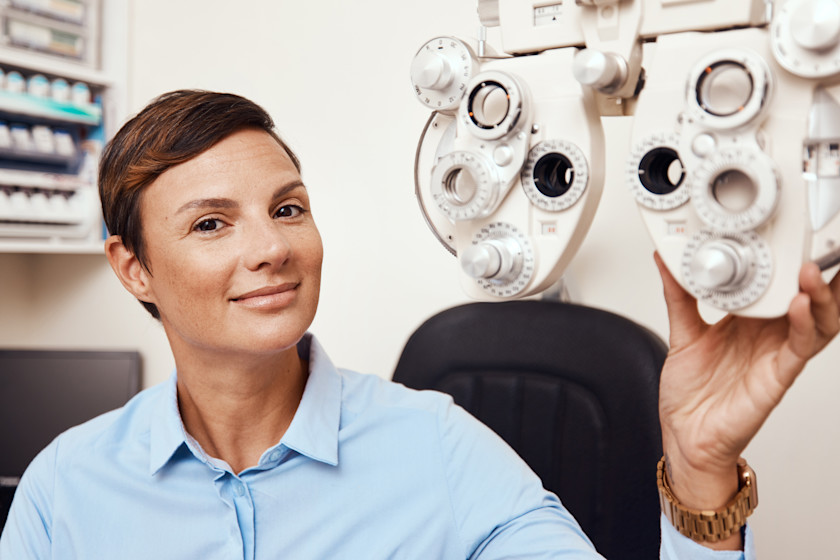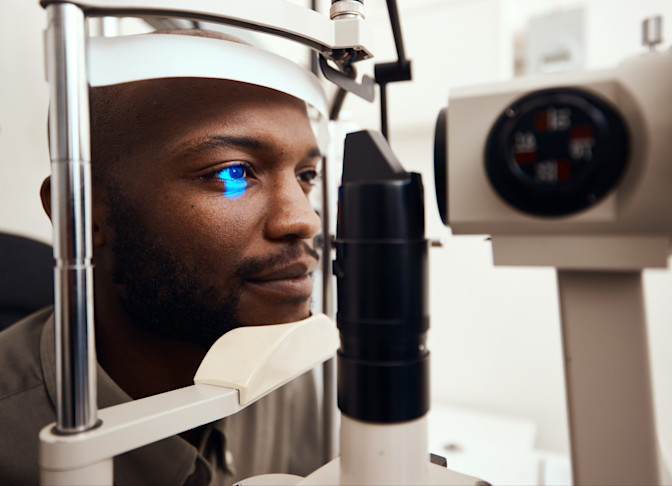Buy one pair of eyeglasses, get a second pair free!
*Restrictions apply. Click here for details.

Why Do Optometrists Dilate Your Eyes?
Whether you've had a dilated eye exam in the past or this is your first time, you might have some questions about your upcoming eye exam. Why do eye doctors dilate your eyes? What vision problems are they looking for? Do you need to have your eyes dilated every year?
Continue reading to learn more from your local Clarkson Eyecare. We want you to go into your eye exam feeling confident and comfortable.
What is Pupil Dilation?
Pupil dilation is a routine part of a comprehensive eye exam. Your optometrist will use prescription eye drops to temporarily widen the black center of your eye, allowing more light in to give the doctor a clear, wide-angle view of the inside of your eye. A dilated eye exam allows your eye doctor to get a better look at the area behind your pupil, which can help them identify potentially harmful eye diseases before they worsen. Some of these conditions include:
Diabetic retinopathy
Age-related macular degeneration
Glaucoma
Retina detachments
The early stages of many eye conditions don't always have symptoms, so it's important for your doctor to assess the inside of your eye for early detection and treatment. Systemic conditions, such as diabetes, can also be detected during a dilated eye exam.
What Happens When Your Eyes Are Dilated and How Long Does It Last?
Your eye doctor will dilate your eyes using dilating eye drops. Anesthetic is used initially to make sure your dilation is a quick and painless procedure, only taking 15-30 minutes for your pupils to fully dilate. Those with lighter eyes may experience faster dilation than those with brown eyes.
When your pupils are dilated, the pupil shrinks when exposed to light. Your eye doctor will use a high-powered light and magnifying tool to view the inside of your eyes, inspecting your overall eye health and looking for any signs of potentially harmful eye conditions.
While the exam is relatively quick, dilating your pupils may cause temporary light sensitivity and blurry vision. These problems usually wear off in 1-2 hours, but this time varies depending on what eye drop was administered, so be sure to ask your eye doctor for more information.
How to Prepare for a Dilated Eye Exam
The first thing to note is, while the eye exam itself may be fast, dilation usually adds 30-60 minutes to your appointment, making it essential to plan for a longer visit when scheduling your exam. Many people feel comfortable driving, but if you’re light-sensitive, have a long commute, or haven’t had your eyes dilated before, it’s best to plan for a friend to drive you home from the exam. You’ll be more sensitive to glare and may notice near-vision blur for the rest of the day, so try to schedule tasks that require fine print or screen work for later.
Your eye doctor may have disposable sunglasses available for use, but it’s always recommended to bring sunglasses with you in case of light sensitivity after your eye exam. If you wear contacts, bring your glasses along as well. The eye doctor may not want you to put your contacts back in after the dilation, as they could damage your lenses. For kids, plan for a slightly longer visit and bring a snack or favorite activity to make the waiting period more comfortable.
Finally, before you go in for your exam, jot down any symptoms or vision changes you’ve noticed, like flashes, new floaters, headaches, or fluctuating vision, and any questions you’d like to ask your optometrist. With a little preparation, your dilated exam will be smooth, comfortable, and thorough—giving your doctor the best view of your eye health.
Factors That Determine the Frequency of Dilated Eye Exams
The National Eye Institute states that how often you need a dilated eye exam can depend on a few factors, such as your age and personal risk profile. Your eye doctor will be able to advise you on how often to get a dilated exam. You will likely need a dilated eye exam every one to two years if you:
Are over 60
Are of African American heritage and over age 40
Have diabetes
Have a family history of glaucoma
However, these are not the only factors your optometrist will consider. Your eye doctor may also recommend more frequent dilated eye exams to monitor any existing eye conditions.

Frequently Asked Questions About Dilated Eye Exams
Schedule a Dilated Eye Exam with Your Local Clarkson Eyecare
A dilated eye exam may sound like an inconvenience, but it's a simple, painless procedure. Getting one done when your eye doctor recommends it can help detect eye disease early and reduce your risk of vision loss.
Find a Clarkson Eyecare location near you to schedule your comprehensive eye exam today!
